Feel free to subscribe to the calendar to be notified of future events.
The EAGT Event Hall (backup link) is a virtual space neighbouring the main EA Gather Town (contact) for hosting conferences, talks, discussion groups, and more. It looks kinda like a game, but whatever, I think there are strong reasons to prefer this platform over alternatives. More on that later.
We're testing the space for the first time with our unconference on Sunday 12:30 UTC. We'd appreciate it if you joined to help us test it out! You'll also be helping us kickstart something that might turn into a noteworthy part of EA infrastructure. (Update: Around 60-80 people came, and it went well. Awaiting surveys.)
Our hope is that this will be one of many online events organically hosted here by various EA groups around the world. The main point of this post is that having a central venue for online events will help build and maintain an always-active meeting place for the EA community. Events hosted in the Hall will help familiarise people with using the space generally for coworking together, making connections, and having valuable conversations. Insofar as EAG conferences produce value by connecting people from across the world who then fly back to where they live, EAGT produces value for many of the same reasons without having to pay for the flight ticket in advance.[1]
How does it work?
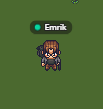
When I step near another person's character, our audio and video connects and I can engage them in a heated debate on the monistic ontology of blueberry muffins.
Alternatively, I could book Auditorium A and lecture an entire hall about it.
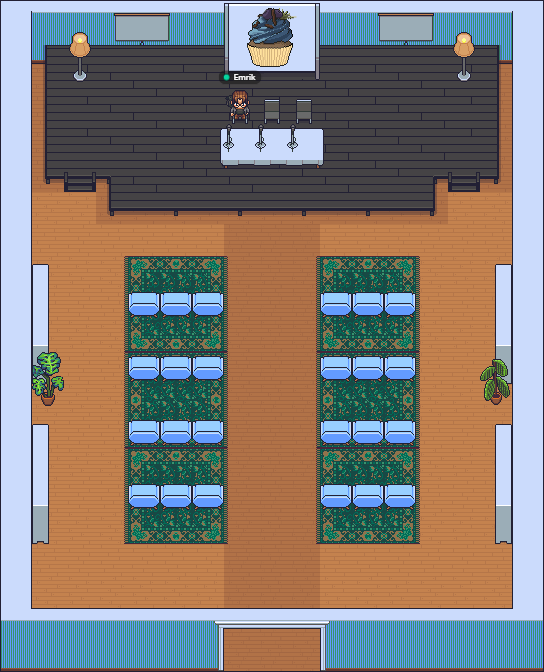
When I'm next to one of the microphones, I can broadcast to the entire room, but I cannot hear anyone in the audience unless I right-click to "spotlight" them. This comes in handy when e.g. they have their hand raised and I want their question to be heard by everyone.
The audience hearing range is limited to include the speaker and the two people sitting right next to them. This allows them to speak to their neighbours if they wish without disturbing anyone else.
Example event: The Unconference
The easiest way to explain what you can do in the space is probably just to take you through our agenda for the unconference as an example. Feel free to take notes, or contact us and we'd be happy to help organise something here or just answer your questions.
Before the event, we've emailed a document with some information for the speakers to help prepare them for the event.
1. Courtyard & intro
When first logging into the space, everyone will spawn near the Earth portal (see image) that links the EAGT Event Hall and the EA coworking and lounge space, where the community is usually found coworking, talking, or socialising.
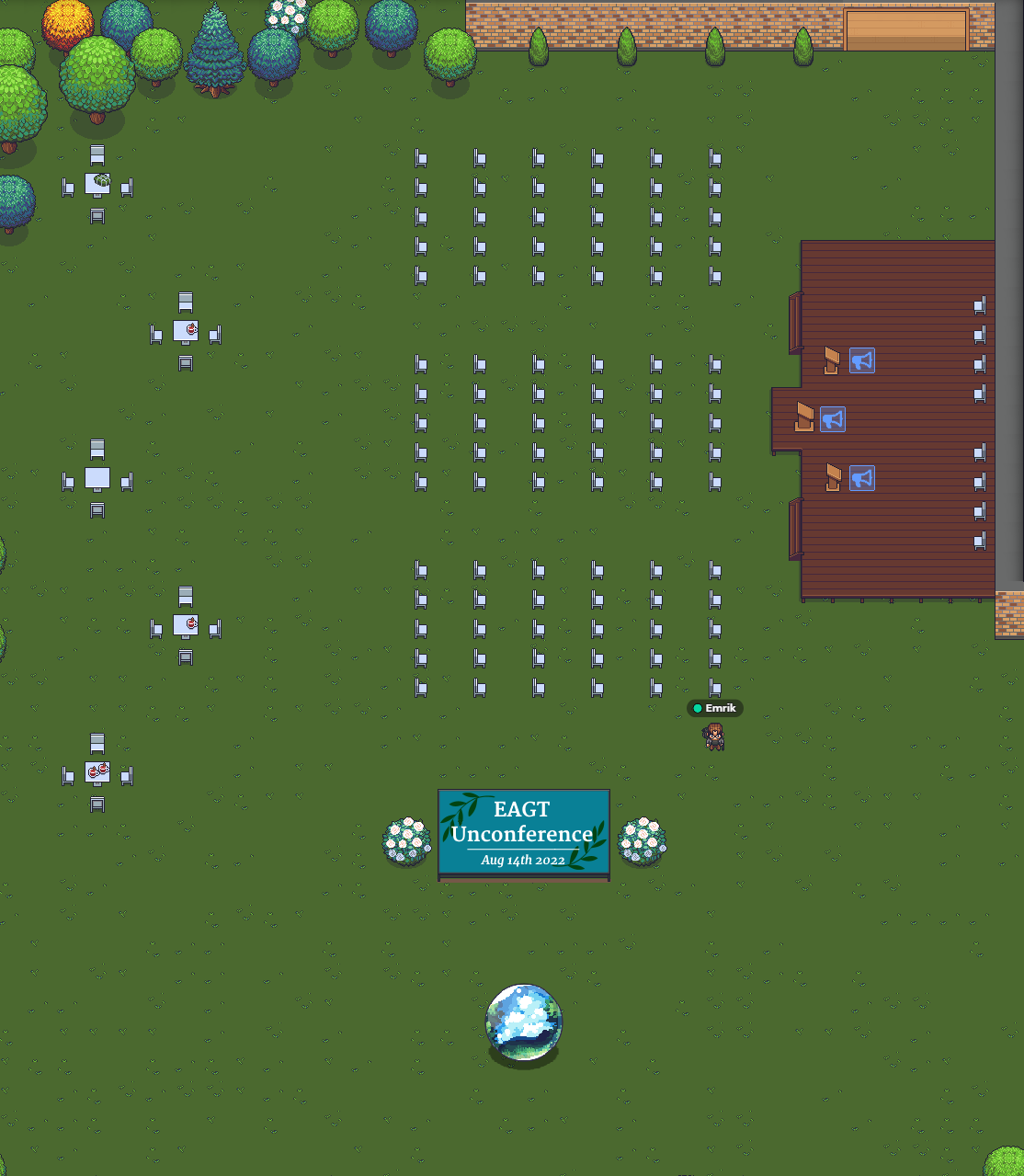
When the event starts, Nguyên will give an introduction (broadcasting from the stage in the image) and share some practical information (like the fact that you can raise your hand with 6 and put it down again with 0). We will then proceed through the door northeast of the stage.
2. Foyer & browsing
From the Foyer, all the session rooms can be found. The full schedule is linked via the big blue poster but you can also see it on the signs above each room. Two sessions will be held in parallel, and the participants may decide for themselves which room to enter. They are also encouraged to just roam, connect, and explore the main space through the portal.
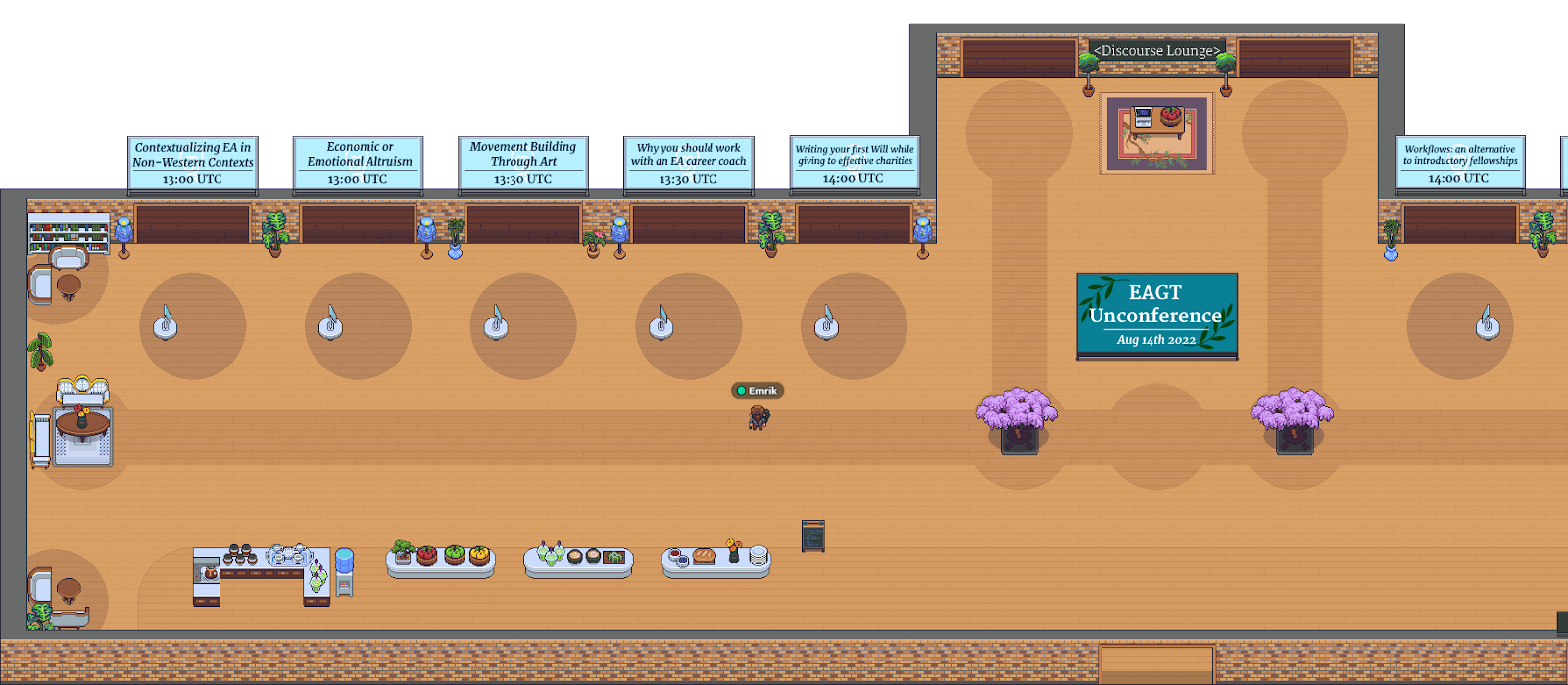
3. Session rooms & group discussions & embeddable Padlets
Each session lasts 30 minutes, but how it's structured is up to the speakers. For example, they could talk for 5 minutes, have 5 minutes for taking questions directly from the audience, and then 20 minutes where each table discusses among themselves and jots ideas/feedback down on their Padlets (unique per table). There are a maximum of 5 chairs per table, because bigger groups make it harder to have good discussions. And because the rooms are unique per session, you don't have to rush people out of there at the end if they're having interesting discussions.
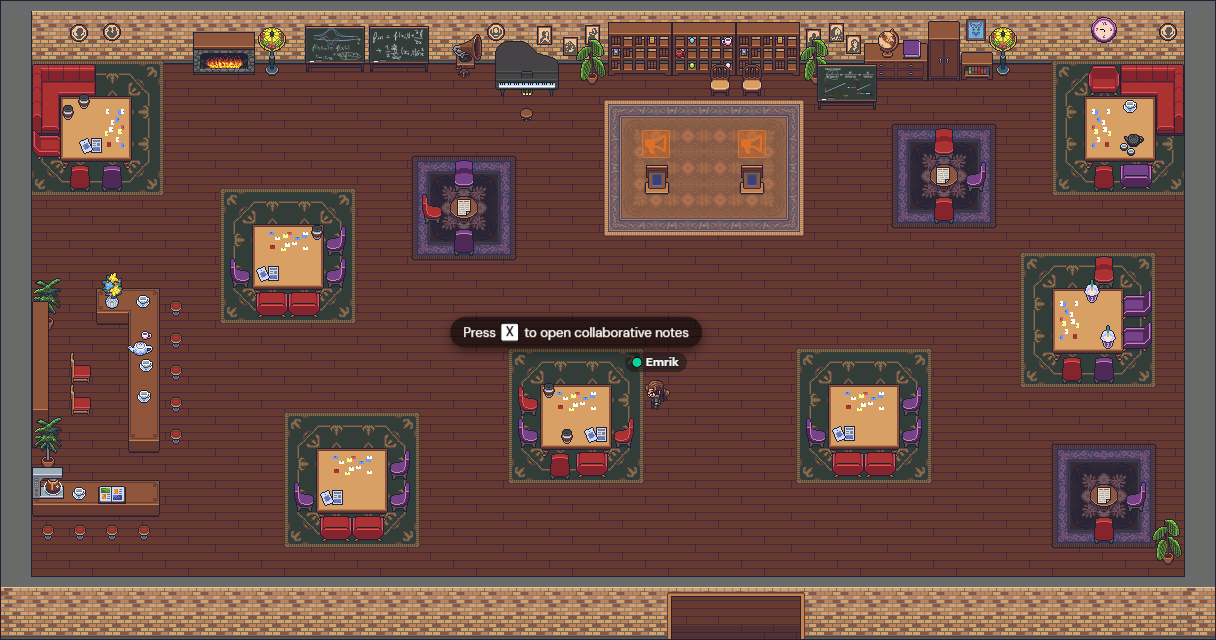
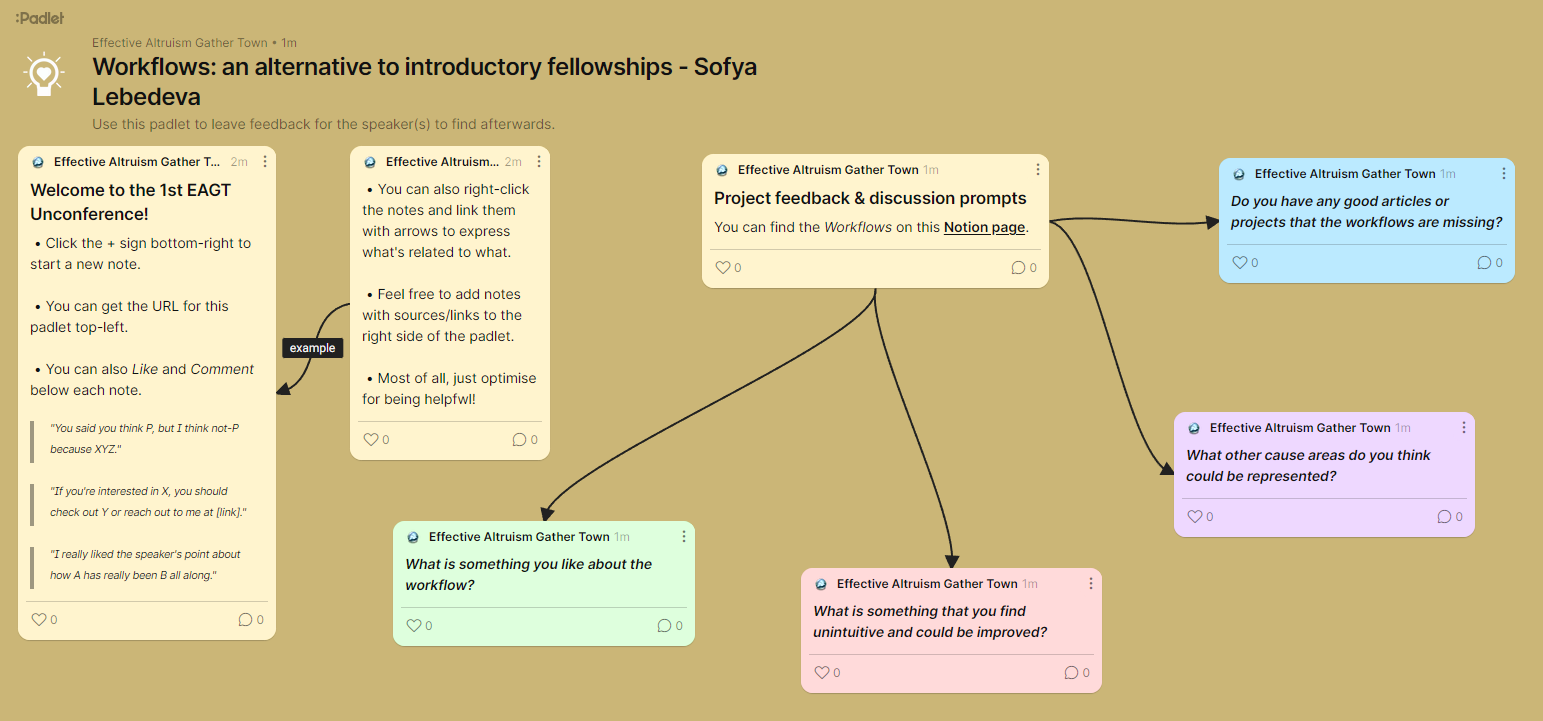
Using Sofya Lebedeva's Unconference session on Workflows as an example.
4. Courtyard & outro & socialising
The EAGT team will briefly outro the event in the same place it was introduced, and then encourage people to explore the main space if they wish (where we'll be offering to give tours as well).
What kind of events can you host here?
For larger events (e.g. conferences, lectures, etc.) I recommend using the Event Hall because it comes with various chat and announcement features that make it easier to coordinate people. But for smaller events (reading groups, meetings, workshops), I recommend using any of the meeting or workshop rooms in the main space. Just so it familiarises people with the main community hub and more directly generates visible activity there (and it helps build a norm around it).
You can see the kinds of ready-made rooms we have in the space below. They're modular and customisable, and we're happy to assist with requests or customisations you'd like for your events.
Additionally, we want our infrastructure to be public (aside from sensitive things) so we can make full use of the many volunteers who wanted to contribute to the project so far. We're not quite there yet, but as a start we keep a public drive folder.
Will this do any good?
The theory of change for online community building deserves a post of its own, but in brief, hosting events either in the Event Hall or the main space gets people familiar with the community hub, and that could lead to them connecting with the community of regulars there. Either via coworking, or finding people to talk to via the social areas, or both. It's probably only usefwl for a minority of EAs, but for people who do keep returning to the space, it can be profoundly usefwl. For people it sounds interesting to, I highly recommend exploring it.
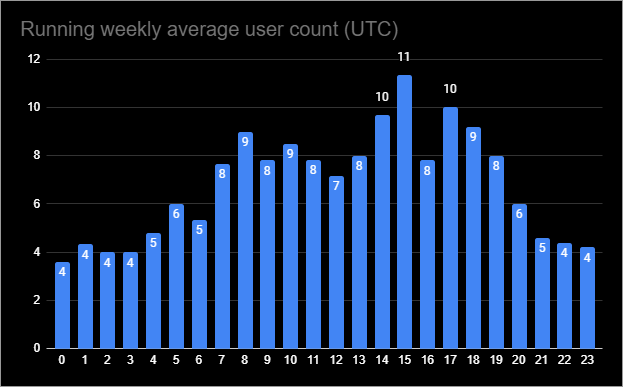
Thanks, Jonathan & Siao! <3
Anne Wissemann, part of the old EA Workspace coworking community on Complice, succinctly explained one aspect of this. Centering the community around the activity of coworking allows people to bump into each other and maintain connections at a very low time cost relative to many other ways of staying connected.
“Many of us have full schedules and Skype calls to uphold friendships pose a real cost on time and flexibility and can be a pain to arrange. Keeping in touch via the EAW is easy - you’re bound to bump into each every once in a while if you work at similar times. It doesn’t cost you any additional time since you were having a break anyways, and you can make progress on your projects in the meantime. Win-win!”
I think we can classify the key outputs of this project into three buckets. EAGT seems to be helping EAs
- stay productive by connecting them to a social environment with healthy productivity norms. It gives people a feeling of accountability for what they plan to do.
- find valuable connections and/or feel part of a good community. Not to be underestimated, even just for how it sustains one's motivation to do good in the world.
- have valuable conversations/discussions, e.g. about career planning[2], research, mental health, etc.
Related to A, the Off Road Survey found that EA students reported accountability as the main identifiable bottleneck for why they struggle in university. I don't really like the term, and the survey isn't rigorous, but the prior on the claim that accountability is a major bottleneck is already high. And there's no shortage of convincing anecdotes that coworking can be one of the most effective productivity hacks to try for some people, including me. Here's from Alexey Guzey on coworking on Gather:
“I spent many years thinking about productivity, trying all sorts of techniques, and even reaching #1 on the front page of Hacker News with my Every productivity thought I’ve ever had, as concisely as possible. I think almost all of my ideas from that post still check out and yet I no longer believe that it’s possible to achieve extremely high productivity (say 80 hours a week of focused work) sustained over long periods of time working on difficult projects alone.”
B and C are the same targets EA Global conferences are aiming for. But unlike EAG, online community building has the advantage of being long-term accessible, which means that people who connect on here have an easier time actually staying connected. As long as they are coworking regulars, there are always reasons (“excuses”) to keep up the connections and casually bump into each other. And unlike many IRL community hubs, it's going to stay accessible to people regardless of changes in life-situations (e.g. due to moving or graduating).
We don't have rigorous data for how well we're doing on these metrics, but we've had two surveys so far.
- May survey (23)
- August survey (ongoing)[3]
They're not meant to be rigorous. They're just meant to answer the question "do we at least have anecdotes of people who have benefited greatly from using the space?" And just speaking for myself, I've (counterfactually) received invaluable feedback on my research projects from people on here.
Hence why I hope some of you guys might wish to help expose more EAs to how the space works (e.g. by hosting events/meetings/discussions), so that the people who could profoundly benefit from it end up having that opportunity. Just let us know!
- ^
To be clear, connections made online don't have to stay online. I know of at least two people who have met up IRL after connecting on Gather. ^^
- ^
I've personally had at-length career-planning conversations with at least 9 people on here, both for me and for them. Whether the feedback I've given them is net-positive is another matter entirely, of course.
- ^
We just announced this survey, and it's going to be skewed positive with responses from regulars at first. But I'm not pretending the survey is more than it is, and I trust you to evaluate evidence as a proper Bayesian.

Hey!
May I suggest opening a Google Calendar that people can import and see when events are coming up? I'd totally use that personally
Just made one and added it to the top of the post. It's an AddEvent thing, but you can subscribe to it with google calendar.
Yeah, that's great (all I wanted is the ability to subscribe to it)
Thanks, added :)